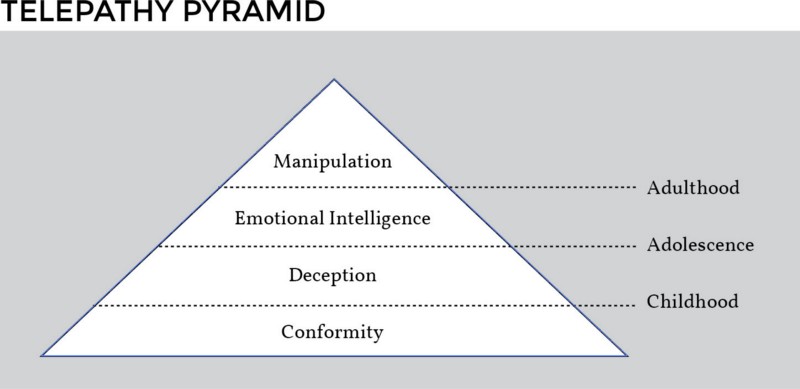April 11, 2016

Special Hell 8: Telepathy Blockers
Dare to ascend the mind reading pyramid
When I was young I believed that adults had telepathic powers. Like living Zoltar machines, these enhanced beings could predict my every move. It was uncanny. Telepathy was the only explanation for the ease in which they thwarted my plans.
So, like any data-driven child, I created tests to prove my hypothesis. If I stand next to the cookie jar will mom know what I’m thinking? If I hide under my bed without making a sound will she know where I am? If I hold contraband behind my back will she know I have something I’m not supposed to?
My first tests were conclusive. Mom was a mind reader.
It was harder to create tests for adults outside the controlled laboratory of my home, but the external data I managed to collect supported my theory that all adults have at least some level of telepathic ability.
So what does a kid do with this knowledge?
First, you conform. When your world is ruled by telepathic overlords, you live in fear that every original thought could result in punishment. If your mind is an open book, the obvious solution is to change your thoughts. How hard can it be? When your mind generates the idea of a naughty word, you stifle the thought. You compensate for the discretion by thinking thoughts of remorse followed by mental requests for forgiveness. Eventually the ideas might go away. But they don’t. So the conformity phase is short lived, you get brave, and start to test the limits of what you can get away with.
Then you lie.
Little by little you learn to use the system to your advantage. You invent tiny white non-truths, complex falsities, and tales of big fish. If you have kids you have probably witnessed these experiments up close. Innocent beings mimicking the fraudulent habits of their parents. So precious.
A lie is nothing more than telepathy blocking. You lie to prevent people from knowing what you are really thinking. You do it every day and you’re very good at it.
Studies suggest that you lie about 3 times for every ten minutes of conversation. I know you want to deny it, but you also know it is probably true. On the flip side, you will hear about 200 lies every day. That is pretty messed up, no?
How do you function in a society that is so saturated by lies? The answer is a buzzword that you might be familiar with called an EQ. If Zoltar could speak, he’d tell you,
Thriving among liars requires emotional intelligence.
Emotional intelligence is the maturing phase in the evolution of a telepathic being. As a child you conformed by suppressing bad thoughts. As an adolescent you rebelled, using lies to block and scramble the telepathic airways. As an adult you learned to function harmoniously within a social system dominated by lies.
Practical telepathy (a.k.a. emotional intelligence) looks like this: We read emotions, we recognize cues of body language, and we communicate non- verbally. We realize that most people are lying to us most of the time and compensate accordingly. We build trust, we sympathize, we spare people from embarassment, and we make calculated compromises. Society functions despite the lies.
That’s not the pinnacle of telepathic development, however. There is another level of telepathy above the practical realm of emotional intelligence. At the top of the telepathy pyramid are the masters of manipulation. The hierarchy looks like this:

As a child you conform to the will of the mind-readers. Adolescence involves learning how to lie. As adults we maintain order by developing emotional intelligence. At the top of the pyramid are the masters of manipulation.
Manipulators occupy the peak of the pyramid and like kings of the food chain these predators have the ability to manipulate our thinking because they understand our thoughts better than we do. Most people are vaguely aware of their existence, but doubt the power these manipulator have over their minds. We all want to believe we are independent thinkers, but the reality is we rarely see the invisible hand pulling the strings in our skulls. Let me give you an example…
I could pick on politicians, advertisers, lawyers, Trump, salesman, SEO scum, or some other professional field of manipulation. But since this series is about the special place in hell for designers, that’s where I will point my thumb.
Designers may not realize it, but our training equips us with an arsenal of manipulative tools that influence people beyond the realm of ordinary awareness. Like a telepath, our skill invisibly interacts with other people’s minds.
We exercise the persuasive properties of color.
We employ contrast to ratchet up the impact of our creations.
We are masters of text, using our typographic knowledge to create meaning.
We manipulate images to obscure flaws and exaggerate desirable elements.
We jedi-mind-trick our audiences, controlling what they see, and how they feel.
What is UX other than an invisible hand guiding people to perform the action you have predestined?
Often our designs are driven by intuition, a mystical certainty that our work possesses the immeasurable ingredients necessary to induce action.
And if we are good enough at our job, it works. We can change people’s perceptions, beliefs, and actions.
One result of our manipulative design powers are cultural artifacts otherwise known as brands. Beyond the promotional jargon of marketers, a brand is nothing more than a cultural illusion, an addicting shortcut that designers can harness to manipulate the herds.
And when it comes down to it there isn’t a single printed object that hasn’t been influenced by the manipulative skills of a designer. Every website, advertisement, and app contains some designer’s fingerprint. Pick your propaganda, it is a safe bet it was produced by a designer.
Don’t mistake my observations as a condemnation of our profession, however. The purpose of my post is to encourage us to admit the immense power designers wield. We are not passive helpers in systems beyond our control. We hold the keys. Too often, the mantra of our profession is the unspoken words, “That’s not my job.” Instead of taking Earth’s rudder, we let ourselves become the tools of less honorable manipulators. Manipulation doesn’t have to be negative, however, and if anyone can use this power for good it is designers.
You can be like Zoltar, selling your soul for quarters, or you can embrace your telepathic prowess and design a better world. Use your skills, change minds, and claim your spot at the top of the pyramid.
Thanks for reading. If you think this story was manipulative, I should warn you about my book. Still, you might want to consider following me to keep up with my weekly brainwashing attempts. Last week I wrote about Stasis Crackers. Mmmm, stasis.
Oh, and this series of “Special Hell for Designers” stories is continued in part 9 where I talk about Pissing in the Wind. Stay creative.
Previous: Month 3 of Daily Art